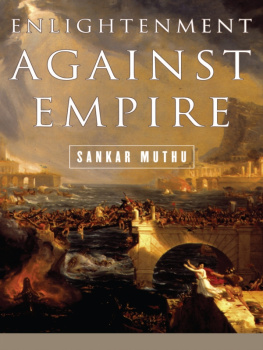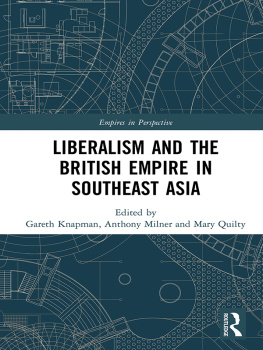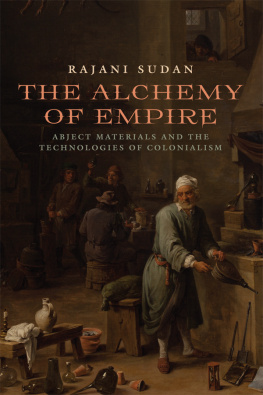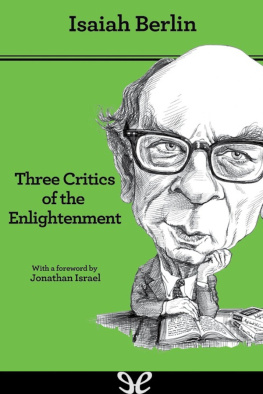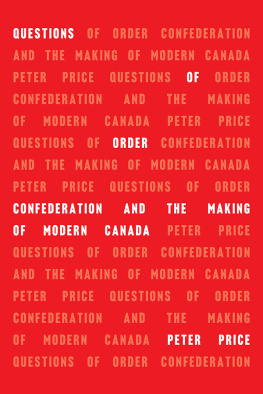ENLIGHTENMENT AGAINST EMPIRE
ENLIGHTENMENT AGAINSTEMPIRE
Sankar Muthu
PRINCETON UNIVERSITY PRESS
PRINCETON AND OXFORD
Copyright 2003 by Princeton University Press
Published by Princeton University Press, 41 William Street,
Princeton, New Jersey 08540
In the United Kingdom: Princeton University Press, 3 Market Place,
Woodstock, Oxfordshire OX20 1SY
All Rights Reserved
Library of Congress Cataloging-in-Publication Data
Muthu, Sankar, 1970
Enlightenment against empire / Sankar Muthu.
p.cm.
Includes bibliographical references and index.
eISBN 9781400825882
1. Imperialism. 2. Political scienceEuropeHistory18th century.3. Enlightenment. I. Title.
JC359.M87 2003
325'.32'01dc212002042717
British Library Cataloging-in-Publication Data is available
This book has been composed in Galliard
Printed on acid-free paper.
www.pupress.princeton.edu
Printed in the United States of America
10 9 8 7 6 5 4 3 2 1
For my parents
After the city or town comes the world, which the philosophers identify as the third level of human society. They begin with the household, progress to the city, and come finally to the world. And the world, like a gathering of waters, is all the more full of perils by reason of its greater size. First of all, the diversity of tongues now divides man from man.... It is true that the Imperial City has imposed on subject nations not only her yoke but also her language, as a bond of peace and society, so that there should be no lack of interpreters but a great abundance of them. But how many great wars, what slaughter of men, what outpourings of human blood have been necessary to bring this about!Those wars are now over; but the misery of these evils has not yet come to an end.
(Augustine)
Contents
ACKNOWLEDGEMENTS
The initial research for this book was made possible as a result of generous funding by the Social Sciences and Humanities Research Council of Canada. I also thank the Mellon Foundation for a dissertation completion grant. The Center for European Studies at Harvard University provided me with an intellectually stimulating and elegant environment for my last two years of dissertation research and writing and also for the spring semester of 2000, while I was on a research leave from the New School. While at the Center, I enjoyed spirited discussions with dozens of faculty associates, visiting scholars, and graduate student affiliates; I thank in particular Tom Ertman, Josep Fradera, Stanley Hoffmann, Susan Pedersen, Dana Villa, and Patrick Weil. I would also like to acknowledge the wonderful staff there, especially Abby Collins, Lisa Eschenbach, Anna Popiel, George Cumming, and Sandy Selesky.
Once as fellow students and now as colleagues, I am very fortunate to have the intellectual advice and friendship of Arash Abizadeh, Gary Bass, Ben Berger, Chris Brooke, Peter Cannav, Mark Duckenfield, Sam Ewing, Michaele Ferguson, Jim Fuerst, Mala Htun, Nancy Kokaz, Karuna Mantena, Jason Niedleman, and Tim Shah. I especially want to thank Patchen Markell and Andy Sabl both for their friendship and for countless conver-sations about the variety of issues that I discuss in this book. I would also like to single out the original 6 Marie gang: Libra Hilde, Jamie Jones, Paul Talcott, and Kim Reimann, as well as Geoff Herrera, for their sup-port and laughter. I am indebted to all my friends from Canada and from college for their camaraderie.
Presentations at a variety of conferences and colloquia helped me to sharpen my arguments and provided welcome opportunities to reflect upon thoughtful criticisms; many thanks to all those who offered comments on my research. I thank Morris Kaplan for many conversations and for his invitation to give a lecture at SUNY-Purchase. Ian Shapiro kindly invited me to present at the Yale Political Theory Colloquium. I also thank David Johnston for his support and an invitation to present my work at the Faculty Seminar in Social and Political Thought at Columbia University. I benefited from many discussions after having presented a paper at a conference on Europe and Empire at the Center for European Studies at Harvard University. Thanks also to the participants of The Enlightenment and Its Legacies conference, sponsored by the Conference for the Study of Political Thought, at Yale University, and especially to Richard Falk for his perceptive comments there. I am indebted as well to questions and suggestions that I received on a panel about liberalism and rights at the International Society for the Study of European Ideas conference in Bergen, Norway. I thank Anthony Pagden, J.G.A. Pocock, Alan Ryan, and Bernie Yack for participating in a panel that I organized about Pluralizing the Enlightenment, as part of the 1999 American Political Science Association conference in Washington, D.C.; I learned much from their papers and comments. Alan Patten offered illuminating questions about my chapter on Herder at a panel on Enlightenment political thought and nationalism, organized by Patricia Nordeen, at the 2002 APSA conference in Boston.
At two conferences, I presented papers based on the research for my next book on Enlightenment debates about transnational commerce and globalization, but the thoughtful commentary I received there helped me in my final revisions for this book. I thank Kirstie McClure for inviting me to the conference on Inside/Outside Constitutionalisms: Rights, Revolutions, Empires, c. 16401848 at the Clark Center of the University of California at Los Angeles, and for her cogent questions and comments. While at the Clark Center, I had many valuable conversations with J.G.A. Pocock, who offered encouragement and much erudite ad-vice. I thank Erik Bleich, Stephane Dufoix, and Patrick Weil for inviting me to present a paper at a conference on The Legacy of Colonization and Decolonization in Europe and the Americas, sponsored by the Centre d tude des Politiques Immigration, dIntgration et de Citoyennet (CEPIC) of the Sorbonne (Universit de Paris, I).
An early version of some of the arguments that I make in chapter 7 was published as Enlightenment Anti-Imperialism in Social Research, vol. 66 (1999). Justice and Foreigners: Kants Cosmopolitan Right, in Constellations, vol. 7 (2000), contains a previous version of some parts of chapter 5.
The Graduate Faculty of the New School for Social Research was an exciting intellectual home. Its unusual commitment to interdisciplinary thinking, scholarship, and conversation has been an inspiration for my work. I am indebted to Nancy Shealys tireless efforts at forging order out of chaos. I thank my undergraduate students for their enthusiastic interest and lively participation in my seminars on the history of debates over slavery, empire, and international justice, and the excellent graduate students at the New School for innumerable discussions about the issues under study in this book, many of which helped me to refine my arguments. I owe much to all of my New School colleagues, but I especially would like to acknowledge my comrades in the Department of Political Science: Nancy Fraser, Vicky Hattam, Mala Htun, Courtney Jung, Jacob Landynski, Jim Miller, David Plokte, Addie Pollis, Adolph Reed, Jr., and Ari Zolberg. I am also very grateful for the encouragement given to me by my colleagues in the Department of Philosophy, in particular Richard Bernstein, Jay Bernstein, Agnes Heller, Dimitri Nikulin, Charles Taylor, and Yirmiyahu Yovel. I offer a special thanks to my extraordinary junior faculty colleagues across all of the departments at the Graduate Faculty.
Judith Shklars exemplary scholarship on Enlightenment political thought, which first drew me to Harvards Department of Government, has served as a model for my feeble efforts. As I developed my dissertation prospectus, I received helpful comments from Peter Berkowitz, Daniel Gordon, Bonnie Honig, and Tzvetan Todorov. Linda Zerilli offered constructive comments on an early version of my writings about Diderots understanding of Tahiti. I have also gained much from incisive conversations about Enlightenment political thought with Istvan Hont, George Kateb, Gordon Lawson, Steven Lukes, John McCormick, Michael Mosher, Bhikhu Parekh, Corey Robin, and Alan Ryan. Michael Suarez, S.J., has been both a kind friend and has served as an example of scholarly integrity. I am grateful to Melvin Richter and Bernard Yack for having read my book manuscript and for offering insightful advice. In addition, I thank the anonymous readers of my book for their conscientious, detailed, and invaluable commentary. Many thanks to Terence Moore at Cambridge University Press for his generous support of this project. I am indebted to Linda Truilo for her thorough and expert copy-editing and to Maria denBoer for her careful preparation of the index. Ian Malcolm, my editor at Princeton University Press, has been a joy to work with; his excitement about this book and his attention to its every detail have aided me in innumerable ways.
Next page
